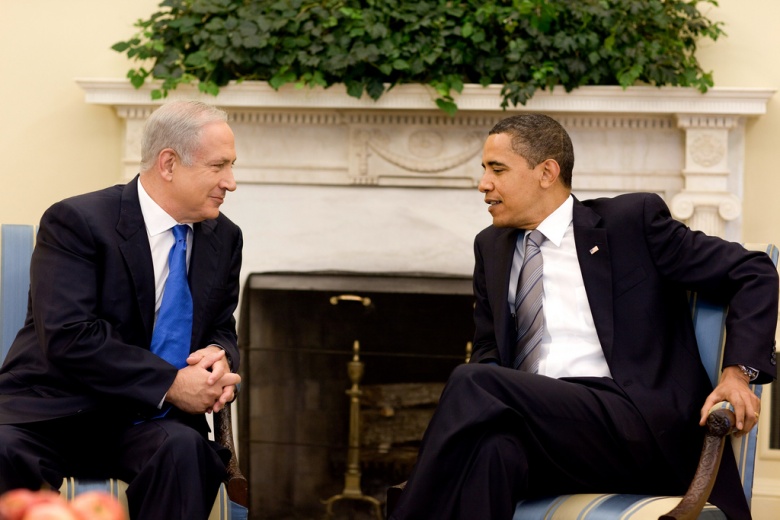Trita Parsi
A senior German official told me in 2010, quite proudly, that under the leadership of Angela Merkel, Germany’s Iran policy had become a function of its relations with Israel. Whether Germany would sanction Iran or engage in diplomacy very much depended on Israel’s reaction. In its simplest form, the German official was explaining to me the process of “Israelizing” Iran—that is, turning one’s policy towards Iran broadly into a function one’s relationship with Israel.
No U.S. official has ever described U.S. policy on Iran in those terms to me. And if they did, most likely, it would not be accurate. But in the course of the last two years, particularly this past summer, we have also seen that Israel has paid a far greater role in America’s Iran policy than many previously would have admitted. And for many on Capitol Hill, the reality is that Iran is primarily viewed through an Israeli lens.
This will be a major problem for President Obama, and for subsequent administrations seeking to sustain the nuclear deal with Iran. Not because Washington would not like to see significant changes in Iran’s posture towards Israel, or that it doesn’t believe that continued Iranian hostility towards Israel wouldn’t be a threat to the nuclear deal, but because the de-Israelization of Iran requires much more than just a change in Iran’s policy on Israel.
To understand why, we must first recognize why and how Iran came to be viewed from an Israeli lens by so many in Washington in the first place.
Iran was not an Israeli issue in Washington back in the 1980s, despite the hostile rhetoric of Iran’s then-ruler Ayatollah Ruhollah Khomeini. On the contrary, Israel spent significant diplomatic capital in Washington at the time trying to convince the Reagan administration to reach out to Tehran and come to terms with Iran’s theocratic regime. What later turned into the Iran-Contra scandal is just one of the many initiatives Israel took at the time to get Washington and Tehran back on talking terms. Back then, Israel was primarily concerned with the conventional military capabilities of hostile Arab states and viewed Iran as a potential ally and a balancer against the Arab powers.
Similarly, Washington’s pro-Israel organizations, led by AIPAC, were focused on countering the Palestinians and hostile Arab states. Iran wasn’t anywhere near their radar.
As the Oslo process transformed Palestinian leader Yasser Arafat from a terrorist enemy to a peace partner, Israel’s attitude towards Iran began to shift dramatically. To sell the deal domestically, then-Prime Minister Yitzhak Rabin felt that another threat needed to be looming in the horizon. Rabin asked rhetorically what the real threat to Israel was: the weak Palestinians or the rising Iranians?
Moreover, in the new geopolitical reality of the region after the fall of the Soviet Union and the defeat of Iraq in the Persian Gulf War, the common threats that had provided the basis for Israel’s alliance with Iran in the era of the Shah, and Israel’s support for U.S.-Iran dialogue in the 1980s, were now gone. A U.S.-Iran rapprochement under these circumstances would come at the expense of Israel’s interest rather than enhancing Israel’s regional position. “There was a feeling in Israel that because of the end of the Cold War, relations with the U.S. were cooling and we needed some new glue for the alliance. And the new glue… was radical Islam. And Iran was radical Islam,” Israeli analyst Efraim Inbar told me in October 2004.
A massive campaign was launched to depict Iran as “the greatest threat [to peace] and greatest problem in the Middle East.” Iran and its Shia ideology were the source of Islamic fundamentalism and an irredeemable threat, Israel argued.
This focus on Iran was a complete 180 by Israel, who only a few years earlier had pressed Washington to talk to Iran, to sell arms to Iran and to ignore Iran’s anti-Israel rhetoric.
At first, Israel’s new line on Iran was met with skepticism. That Iran suddenly was the new threat to the region was, “a controversial idea” with little credibility, according to The Washington Post. “Why the Israelis waited until fairly recently to sound a strong alarm about Iran is a perplexity,” argued theNew York Times. (See Treacherous Alliance – The Secret Dealings of Israel, Iran and the US for details.)
This sentiment was shared by the Clinton administration, who felt that Israel was exaggerating the Iranian threat for political gain, mindful of the fact that the campaign came at a time when Tehran was lowering its profile on the Palestinian issue. “At that time, there were Iranian attempts to rhetorically soften the radical language of Khomeini,” Keith Weissman, the point person at AIPAC explained to me in an interview in 2004. “No doubt about it, there was a famous Rafsanjani interview… where he said that if it’s okay with the Palestinians, it’s okay with us.”
 Geostrategic Media Political Commentary, Analysis, Security, Defense
Geostrategic Media Political Commentary, Analysis, Security, Defense





